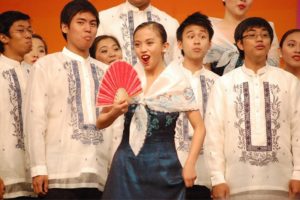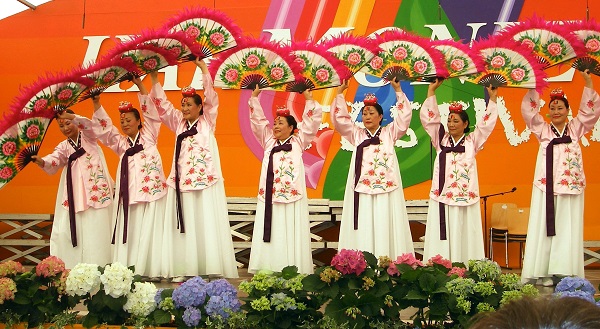Enthusiastic Reactions to the Festival in Lindenholzhausen (Germany)
by Gerhard Neunzerling-Dernbach, member of the programme committee of the Harmony Festival
“What a wonderful festival … !”
(Reijo Kekkonen, member of the jury 2011)
“Bravo, Harmony!”
(Robert Sund, member of the jury 2005 and 2011)
“I experienced many unusual things in Lindenholzhausen: from ancient ethnic tunes and dances all the way to the most up-to-date contemporary choral music, from most artistic performances of folklore to folk dancing bursting with energy … I am very happy!”
(Karmina Silec, member of the jury 2005)
“Thanks for a fantastic Harmony Festival! Thanks for the hospitality … ! Thanks for so many deeply moving moments of great music during the festival!”
(Theodora Pavlovich, member of the jury 2011)
Thus, or in words to the same effect, did many participants, members of the audience and artists express themselves after the 6th Harmony Festival, for which, from 2-6 June, more than 180 choirs and folklore ensembles with more than 5,000 participants originating from nearly 40 countries and cultures had gathered together in Limburg-Lindenholzhausen (Germany) in order to celebrate music and dance in a great festival.
It was for the sixth time since 1981 that ‘Harmony Lindenholzhausen’, a male voice choir with great experience and success on the international stage, had issued the invitation to ‘Germany’s largest singing village’ (thus Federal Chancellor Angela Merkel in her words of greeting). More than 10,000 people with an interest in choral music and folklore from Germany and many neighbouring countries attended the competitions, events and concerts. In their colourful local costumes and with instruments typical of their countries, the many thousand participants offered spontaneous performances in the festival space and at the hill with the flags and the huge globe, thus providing the famous ‘Harmony Festival’ atmosphere.
The Choir Harmony and the Harmony Festival
The male voice choir Harmony Lindenholzhausen was founded in 1906 by eleven young singers. During the 1950s, by means of concert tours to more than twenty countries and through arranging many international choral concerts as well as staging the Harmony Festival, Harmony has gained a high reputation and many friends all over the world. The choir won prizes in several national competitions of repute, among them the ‘German Choral Competition’, and at international competitions. Vytautas Miskinis, Robert Sund and other contemporary composers have written or arranged choral works for Harmony.
The foundation stone for the Harmony Festival was laid in 1957 and 1959 when the choir undertook its first visits abroad, to Llangollen (Wales) to the “International Musical Eisteddfod”, a festival for singing, folklore and music, which remains world famous to this day. Here the singers of Harmony experienced how tolerance and friendship can be promoted and deepened through musical encounters and took the initiative to establish many contacts with choirs from all over the world. These experiences soon led to further concert tours of the choir to many countries and soon, the desire took shape one day to be able to welcome guests from all over the world in Lindenholzhausen, too. Then, following on the first international concerts in Lindenholzhausen, in 1981 for the first time an independent, international festival was brought to life. Because of the great support from participants and visitors, the festival was run again in 1987, 1993, 1999 and 2005. The experiences gained then also formed the basis for this year’s Harmony Festival. Its high public esteem is also documented by the fact that, from 1987, whichever Federal Chancellor was in office at the time took over the patronage of the festival.
The choir Harmony Lindenholzhausen sees the Harmony Festival as an international project for peace, understanding among the peoples, and cultural exchange. The particular flair of the festival is supplied by the very varied and spontaneous offerings of the folklore groups and choirs. The concept of competition moves into the background, in favour of spending time together in friendship. During the earlier festivals, nearly 8,000 members of choirs and folklore groups stayed with families of choirs or groups, which have friendly links with the organiser and thus established international friendships, which in many cases have lasted over many years.
Germany’s Federal Chancellor as Patroness and Many Celebrities Attending
The artistic direction of the Harmony Festival 2011 was entrusted to Jan Schumacher, who is among many other things musical director of the host male voice choir Harmony Lindenholzhausen and the male voice chamber choir ‘Camerata Musica Limburg’ (Germany). Jeroen Schrijner, erstwhile President of Europa Cantat who, together with the charming Ina Gehrig, acted as eloquent, multi-lingual and well-informed compère, leading the audience through the varied and much-acclaimed programmes of the evening concerts, was pleased to serve this festival and its promotion of friendship among peoples.
By taking over the patronage, the German Federal Chancellor Angela Merkel had put on record the special cultural and peace-promoting importance of the festival. The First Lady of Taiwan, Mrs Mei-Ching Chow, conveyed the greetings of the Taiwanese president in person. At the prize-winners’ concert she was able to hand over special prizes to the Taipeh Male Voice Choir and its young conductor Yen-Hsiang Nie, for outstanding interpretations and achievements. The ambassador of Costa Rica, José Joaquin Chaverri Sievert, accompanied two choirs from his country and showed himself to be impressed by the events and the organisation. On behalf of the Federal Chancellor, state minister Michael Boddenberg conveyed her best wishes for the success of the festival.
Several radio and TV stations from Germany as well as abroad were represented by their teams and produced reports about the festival and about how well “their” choirs and ensembles had done.
Greetings from the Secretary General of the United Nations
During one of the evening concerts, the “United Nations Singers”, the staff choir of the United Nations, conveyed a message of greetings, as moving as it was impressive, from Ban Ki-Moon, the Secretary General of the United Nations. The Chair of the organising male voice choir Harmony, Karl-Heinz Dernbach, was proud to receive the personal letter from the Secretary General.
Famous Choral Jury
Points and awards for the choral competitions were allocated by an international jury:
Theodora Pavlovich (Bulgaria), Anna Tarnovska (Poland), Reijo Kekkonen (Finland), Robert Sund (Sweden), Jürgen Budday (Germany) and Wolfgang Schäfer (Germany).
All in all, there were eighteen choral categories and folklore competitions as well as eight special concerts in which choirs and ensembles of world rank performed for an enthusiastic audience on four stages. A female singer from a choir from the USA, which is very successful internationally said, full of emotion, “I have never ever experienced such a wonderful atmosphere and so much affection as with our host choir, anywhere. This is like the Olympic games!”
World-class Choirs Appear in “World-class Form”
There were two concerts that, above all the others, became a veritable demonstration of the world elite of choirs and folklore ensembles: the opening concert and the prize-winners’ concert, both in front of audiences numbering more than 2,000. From the large mixed choirs dazzling us with their rich sonorities and huge artistic skills like the University of Louisville Cardinal Singers (USA), the Ateneo de Manila College Glee Club (Philippines) or the Pacific Lutheran University Choir of the West (USA) all the way to the fantastic chamber choirs and ensembles like Coro Entrevoces (Cuba), Cantamus Dresden (Germany), Imusicapella (Philippines), PLUtonic Vocal Ensemble (USA) and SonicSuite (Germany) – from outstanding youth choirs such as the Youth Choir of Belarus State Academy of Music (Belarus) and the Stockholm Music Grammar School Youth Choir (Sweden) all the way to wonderful folk music choirs like El Café Chorale (Costa Rica), the Catholic Junior College Choir (Singapore) or the Children’s and Youth Choir of the TV and Radio Station St Petersburg (Russia) – again and again, the audience responded with storms of applause and standing ovations. The organiser of the festival, the male voice choir Harmony Lindenholzhausen with its 90 singers, was able, in spite of being under intensive pressure because of the festival activities, to prove its international rank with spirituals, choral works by Franz Schubert and the world première of a choral work by Robert Sund.

An artistic highlight beyond all comparison was set by a special concert by the famous Stuttgarter Kammerchor, directed by Frieder Bernius, performing works by Johann Sebastian Bach.
Choirs from Five Continents Taking Part in Competitions
The cultural variety of the festival was expressed not only through the folklore events, but also in the choral competitions, as demonstrated impressively by the category “Mixed Voices, Folksong”. Twelve choirs offered a round-the-world musical trip of exquisite beauty. The winners were choirs from the Philippines, Singapore and Costa Rica, followed by choirs from Slovenia, Belarus, Germany and Uganda. The largest number of participants, and equally “exotic”, was to be found in the category “Mixed Voices” with seventeen choral groups from the USA, Sweden, Belarus, the Philippines, Slovenia, Costa Rica, Germany, the Netherlands and Uganda.

Wonderful Folklore From All Over the World
During the folklore events, a totally thrilled audience admired, in the course of four days, 60 ensembles and groups from 25 countries and cultures during twenty hours full of top achievements in dance, music and athletics. In three competitions 22 ensembles submitted to a jury. During the Folklore Gala sixteen ensembles and choirs from four continents displayed the marvellous world of folk dance and folk music from sixteen different cultures. Vladimir Kardanov, director of the professional school of dance ‘Klassika’ in Riga, affirmed to the organisers, “I have rarely seen such a high standard in such density in the many years of my artistic activities”.
Jury member Professor Volker Hempfling had already written in 2005, after eventful festival days, “The combination of choral music and folklore is phenomenal and unique in Europe. The prize-winners’ concert has shown the very high standards of the Harmony Festival”.

